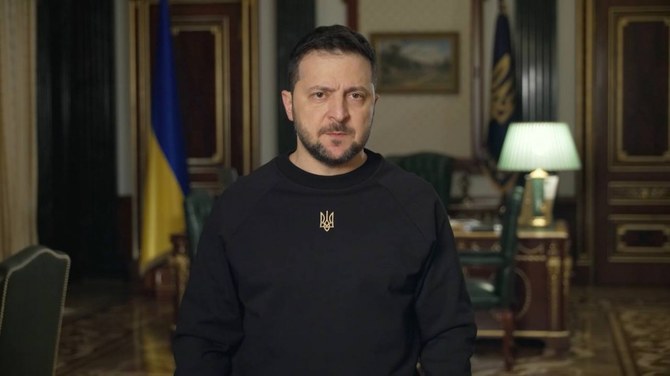LONDON: Ukraine President Volodymyr Zelensky has been barred from making a surprise video appearance during the Eurovision final.
Zelensky had plans to address a global audience of some 160 million people to urge continued support for Ukraine against Russia’s invasion, but his request was rejected by the organizers of the annual song contest, The Times reported.
This came due to concerns over the politicization of the international song contest, said the European Broadcasting Union — EBU — an alliance of more than 100 public service media, including the BBC, which is hosting this year’s Eurovision.
“The Eurovision Song Contest is an international entertainment show and governed by strict rules and principles which have been established since its creation,” explained an EBU spokesperson, stressing that “one of the cornerstones of the contest is the non-political nature of the event.
“This principle prohibits the possibility of making political or similar statements as part of the contest,” the spokesperson said. “The request by Mr. Zelensky to address the audience at the Eurovision Song Contest, whilst made with laudable intentions, regrettably cannot be granted as it would be against the rules of the event.”
According to the spokesperson, the EBU has “featured strongly” Ukrainian music and culture through 11 Ukrainian artists, “including last year’s winner Kalush Orchestra.”
“Additionally, 37 locations around Ukraine will feature in the short film postcards that introduce each of the participating artists before they take to the stage,” the spokesperson said. “We believe that this is the best way to reflect and celebrate Ukraine’s Eurovision Song Contest win and show we are united by music during these hard times.”
Zelensky was also blocked from addressing other entertainment events, including the Oscars in March this year and in 2022, in line with the Toronto Film Festival in September.
Eurovision 2023 was supposed to be held in Ukraine. However, due to Russian aggression in the Eastern European country, the UK hosted the event, vowing to make it a celebration of Ukrainian creativity and culture.
Zelensky recently said that the song contest should not have been hosted by the UK on Ukraine’s behalf, but rather in a country that shares a border with Ukraine, such as Poland and Slovakia, so his people to travel easily, Metro News reported.




























